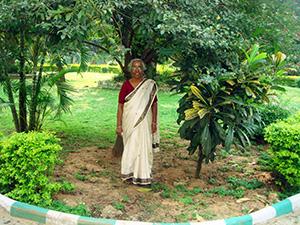
Usha Ravi touches upon the lack of adequate Palliative Care facilities in our country and how important it is to provide comfort to the patient along with proper treatment.
Working with terminally ill patients and their families for over 20 years has helped me value life and accept life’s realities. As a critical care nurse in Melbourne, Australia, I have witnessed and continue to witness the physical and mental stress that the patient and family go through. It is sincerely fulfilling to see that the health care system endeavours to provide the patient and family with respectful and dignified care that they deserve.
My recent experience of seeing my beloved mother suffer in hospital from terminal illness in Bangalore caused deep frustration and dejection in me. I am appalled at the standard of care that terminally ill patients and their family receive in my home town regardless of the availability of resources. My reference is only to the basic essential care that a dying person and the respective family require and deserve.
My mother was admitted to a large hospital in Bangalore for ongoing unresolved liver dysfunction. The plan for my 82-year-old mum or the prognosis of the condition was never discussed with mum or the family. As days went by, mum was put through numerous repeated medical tests with little or no explanation of what it meant or what the results were. They gave mum much discomfort and the family faced not only the uncertainty of what was happening to mum, but also a financial burden. The treating team recommended gastroscopy (examination of the stomach under anaesthetics) while having acute symptoms of hepatic encephalopathy (an advanced disorder of the liver that affects mental state) and flared coagulopathy (clotting and bleeding disorder). What good could it do, when the results of the gastroscopy surely could make no difference to the outcome? Such futile management is imposed on patients and their families until they run out of resources after which the patients and their families are not followed through adequately.
I came home to my mum’s side. I realised how critical mum’s condition was and couldn’t comprehend the attitude of some of the treating doctors. In the eyes of the medical team mum was another “bed number”.
I could see mum deteriorating. She was becoming disoriented, sleepless, distressed and wailing in pain. It was heartbreaking to see my mum in agony and the treating team didn’t support the idea of palliation. My cry for help to the medical team to keep mum pain-free and comfortable, without putting her through further investigations and painful procedures, all went futile.
I then had to make the most difficult and painful decision of my life, that is, take mum home and keep her comfortable - give her palliative care as much as I could arrange. After consultation with the rest of the family, I requested that mum be discharged from the hospital and be taken home. Although the hospital to which mum was admitted offered home care services, when this was requested for, it was not facilitated at the time of need.
Since the treating medical team in the hospital refused to provide me with a prescription for strong pain killers, I had to run from pillar to post for a few days to get a prescription for Fentanyl patch, a medicine which is used for pain relief. My sincere thanks and gratitude are due to one of the cancer palliation therapy units in Bangalore for making Fentanyl prescription available for me. But the question haunts me: why did I have to go through all that difficulty to access much needed pain medicine for my dying mum? What would the ordinary citizen without my medical background do?
Within a few days after coming home mum showed some signs of improvement; though depressed, she was assisted to be ambulatory with assistance and she was verbally responsive. Eventually I said goodbye to my mum, the worst and most cruel decision and action in my life and returned to my family in Melbourne. Mum’s condition further worsened after I left. However, she appeared to be comfortable and she was no longer wailing in pain. She took her last breath peacefully at home on the 22 January of 2014.
As I reflect on my mum’s and my family’s journey dealing with mum’s terminal illness, I feel that the medical system failed us. This whole experience of mum’s illness, dealing with the medical system and palliative care has inspired me to work towards improving access to palliative care.






